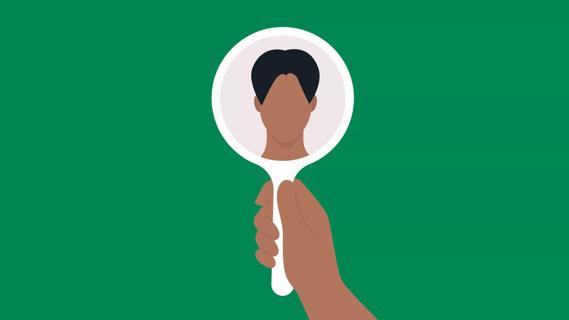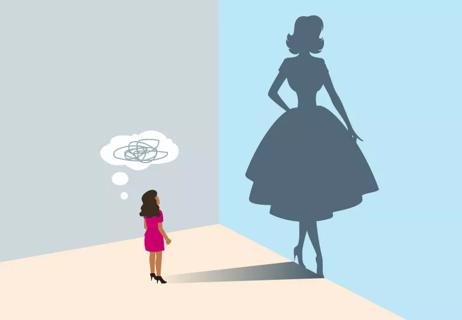Being the center of attention doesn’t mean you have to exile your guest stars

Maybe you embrace “main character energy” right before something big and important happens in your life — something that fits the narrative of your story.
Advertisement
Cleveland Clinic is a non-profit academic medical center. Advertising on our site helps support our mission. We do not endorse non-Cleveland Clinic products or services. Policy
Or perhaps you feel that burst of main character energy during that final push at the end of your workout routine. Just when you’re about to give up, you imagine all eyes on you, and you snap your head back and throw yourself into high gear to cross the finish line. You are, indeed, a warrior who’s strong and fierce, after all. You never give up. You never surrender.
Or maybe your main character energy feels like a growing flutter in your chest during a first date or at a big holiday party. Everything seems to slow down around you as you sweep your way through a crowded room toward your special person. Your face flushed, your hair perfect — you’re the center of everyone’s attention.
These moments of main character energy can stack up to a series of forward-facing behaviors people refer to as main character syndrome. And depending on how you present yourself or impact the lives around you — and whether or not you openly disregard the needs of others — your time in the spotlight can be either empowering or disenfranchising.
Psychologist Susan Albers, PsyD, demystifies the spell of main character syndrome by explaining what makes such behavior a viral topic of discussion in today’s social media. Plus, she answers whether or not you can make main character energy work for you without making yourself the villain.
Advertisement
“Main character syndrome” isn’t a medical diagnosis, but it’s a term that’s quickly piqued curiosity online and social media over the last few years. Main character syndrome is defined by a series of behaviors in which you see yourself as the main character in the story of your life. You are the protagonist and everyone else is often a sidekick or a villain. You often see yourself as the most important person in the room, and you act according to the narrative of your plot — however you define it.
“‘Main character energy’ is perhaps the more appropriate term for this set of behaviors, and with this kind of energy, you often present to the world as if a camera is on you at all times,” explains Dr. Albers.
“Having that perspective — that you are the center of the story — naturally changes the way you present yourself to others and how you act in a public setting.”
When you embrace main character energy, you tend to highlight or reinforce certain aspects of your personality to benefit your story and your place in other people’s lives. For example, if you value being funny, you might ramp up your humor in group settings to play the role of class clown or get out those extra laughs and increase your likeability.
“You view yourself through a storytelling lens, like you’re on a movie or a TV show, and the spotlight is always on you,” says Dr. Albers.
Looked at in another context, when someone comes to you and confides in you about some problems they’re facing, you might romanticize your own problems in response, or disregard someone else’s feelings completely by making their problems about you.
“When you’re romanticizing your problems, you often feel like you have to go through difficult problems because it gives you some sort of growth or character development,” further explains Dr. Albers.
“Sometimes, with main character syndrome, you might often believe it will all magically work out in a positive way or that everything will have a happy ending the way movies tend to wrap things up in the end. But this may not always be the case.”
In essence, when it comes to main character syndrome, you run the risk of being the hero of your own story or being everyone else’s villain if you’re not careful. What causes main character syndrome?
Certain aspects of main character syndrome are often closely related to behaviors associated with narcissistic personality disorder.
“The key difference between narcissism and main character syndrome is the level of stability. For someone who has narcissistic personality disorder, you would see evidence of this throughout their life and in different contexts in their relationships at work and at home,” clarifies Dr. Albers.
Advertisement
“For someone who has main character syndrome, this is something that may be the focus or mindset at certain periods of someone’s life and not in others.”
Main character syndrome can often be associated with:
“A lot of times, main character syndrome can stem from our insecurities if we’re putting forth this false front or the most dramatic part of ourselves to attract the most attention,” says Dr. Albers. “That’s often where the crossover happens with narcissism, and the true aspect of narcissism is a lack of empathy for other people.”
For example, someone with main character energy may show up at a friend’s birthday party but spend an ample amount of time taking selfies, posting about their experience and not showing up in a more genuine way of celebration.
“Main character syndrome can be very toxic to relationships if you’re not thinking about the other person’s needs,” continues Dr. Albers. “People with main character syndrome are often preoccupied with their own needs and accomplishments, making it difficult to support their partner’s emotional experience.”
A person with main character syndrome may alternatively rely on such behaviors as a coping mechanism during times of stress or difficult challenges, or when they’ve had a period where they're constantly down on themselves.
Advertisement
For example, if being in a relationship is a priority for you but you’ve had a myriad of bad experiences, you might still cast yourself as a romantic in search for love and go out on Valentine’s Day anyway in hopes of meeting the love of your life.
The alternative of staying at home and mulling over what’s not working may not be appealing to you because it means you’d have to acknowledge the fact that you are alone.
Instead, you may hold onto that driving hope and those consistent beliefs as a means of bringing about a self-fulfilling prophecy — and you embrace main character energy all along the way by putting yourself first.
“Someone may be turning to these set of behaviors because they may derive a lot of comfort from blaming their negative experiences on being a protagonist, from believing they’re in control of their own narrative and they are the center of the story,” notes Dr. Albers.
Main character syndrome is often exacerbated or made worse by embracing a constant social media presence, doomscrolling or comparing yourself to others online. In fact, studies show different dimensions of narcissism (such as grandiosity, entitlement and vulnerability) are impacted in various ways by how we use and interact with social media.
Advertisement
“Social media is a slippery slope right down into main character syndrome,” warns Dr. Albers. “It really primes people for developing these behaviors because we are constantly posting a highlight reel of our lives, and this sets up the dynamic for many people to feel as if they’re in that spotlight.”
Main character energy includes a host of the following behaviors that can be both good and bad depending on the situation, circumstances and how you’re presenting yourself:
“When you know someone is watching you, you tend to act in a very different way than you would if you were alone,” clarifies Dr. Albers. “If you’re being authentic, you’re dressing, acting and saying things that truly represent who you are. But with main character syndrome, you’re often putting on a wardrobe or a mask to present in a different way.”
And that means many of the behaviors of main character syndrome often go unnoticed until they’re called out by others around you, largely because the negative aspects are often derived from how your behaviors affect those you interact with negatively.
“It may be easier to present this main character syndrome online than in real life,” says Dr. Albers. “At home, you may drop the façade because it can be really exhausting to feel as if you’re always putting on a show.”
Main character energy and its associated behaviors aren’t always bad as long as you’re considering the needs of others around you, even as you view yourself as the main character.
“You can use main character energy as a form of self-care and preserving boundaries without stepping on other people’s boundaries,” says Dr. Albers. “Main character energy can be empowering. It can encourage people to act in ways or step out of their comfort zones and reinvent themselves to improve aspects they want to work on.”
So, how do you make main character energy work for you in a way that doesn’t cast you into exile? Dr. Albers suggests working through some of the following tips.
If you’re celebrating someone’s birthday or graduation or some other important event, or if someone is confiding in you about their problems, you should allow them to have the spotlight and think about things from their perspective.
“The most important thing for someone who struggles with main character energy is to know when to be the guest star and letting other people have the spotlight,” reiterates Dr. Albers. “Working on empathy can be helpful for someone who has main character syndrome, and sometimes it can be good to do some self-reflection in a journal to reflect on how other people react to you and how you’re presenting yourself.”
When tapping into your main character energy and taking up the spotlight, ask yourself if what you’re saying, doing or participating in is something you would say or do if no one else was around or watching.
“Imagine yourself being on camera but dress, act and say what you would normally say without a show, without a presentation or trying to be someone you are not,” suggests Dr. Albers.
Reinventing yourself from time to time can be a good thing, especially if you’ve been putting off honing certain aspects of your personality out of fear, shame or guilt.
A positive example of this is if you’re someone who often feels like you fade into the background, at your next social gathering, you go out of your way to talk to someone new or reconnect with an old friend.
“You can also highlight aspects of your personality that you love that you want to become more forward-facing and publicly known. If you’re funny, maybe you want to focus on that, or highlight other positive things about yourself,” says Dr. Albers. “Where this can become negative is when you’re being fake or you’re adopting someone else’s personality that doesn’t fit for you. These behaviors won’t usually last long if it’s not true or genuine to you.”
Often, main character syndrome revolves around the internalized ideas you have for yourself. When this happens, you run the risk of overlooking how you’re impacting other people.
“The constant craving for attention and validation may lead to an imbalance in relationships,” notes Dr. Albers. “Sometimes, people with main character syndrome may struggle to truly listen and validate their partners’ struggle, which kills honest and open communication.”
To offset this risk, pause and ask yourself how you affect those around you. Or, simply ask them what they think about you as a person, how you could handle things differently or ways you can better support them in their time of need. Just taking extra precautions to hear from other people about how you make them feel can make all the difference.
“You want to take a step back, reverse the roles and take inventory of how you fit into other people’s lives,” encourages Dr. Albers.
“If you feel like people are telling you that you have main character energy, it’s good to take a pause and take inventory of why they think that,” says Dr. Albers. “A therapist can work with you on how these behaviors have developed and how it’s impacting your life and the lives of other people around you.”
“Try imagining your life as a movie and how you’d want the end of the movie to look like,” says Dr. Albers. “What would you want at the end of your movie? What do you need to help you find more direction or reach a little bit higher than you would have in the past?”
Main character energy can help you dream and doing some guided imagery can help you figure out where you should set your sights next in order to achieve your goals.
When you step aside from social media, it helps reduce the issues you have around FOMO (the fear of missing out) and making your comparisons against other people. All in all, a social media detox can help you appreciate yourself more.
“Mindfulness is always helpful when you’re trying to be present in the moment, and it can be helpful to detox from social media and put it aside while you engage in real life,” says Dr. Albers.
If you’re truly looking to embrace your main character energy for the power of good, the smallest way you can do that is to focus on one characteristic or aspect of your personality and explore it to your heart’s content.
“Picking one aspect of your personality to explore and how you want to present that to the world in a new way can often make a lot of sense of your role in the world and all the feelings that you’re experiencing,” says Dr. Albers.
“What is something you want other people to take notice of? Take inventory of that, and then see how you can present that in a way that doesn’t cause harm to yourself or others.”

Sign up for our Health Essentials emails for expert guidance on nutrition, fitness, sleep, skin care and more.
Learn more about our editorial process.
Advertisement

BPD is associated with more frequent mood swings and difficult relationships, while bipolar disorder has more persistent, long-lasting depressive and manic episodes

Psychopathy informs how you develop emotional and psychological connections, while sociopathy is rooted in breaking social rules

Sociopathy is a form of ASPD, characterized by a lack of empathy, disregard for others and persistent breaking of rules

Create a support system, a paper trail, emotional boundaries and a strong sense of self

Narcissistic personality disorder is a mental health condition, not an insult

People-pleasing, perfectionism and putting others first are all signs of this harmful behavior

Perfectionism isn’t all bad, but here’s how to make sure it hasn’t become toxic

People with this syndrome exhibit social behaviors and traits considered immature

Even small moments of time outdoors can help reduce stress, boost mood and restore a sense of calm

A correct prescription helps your eyes see clearly — but as natural changes occur, you may need stronger or different eyeglasses

Both are medical emergencies, but they are very distinct events with different causes